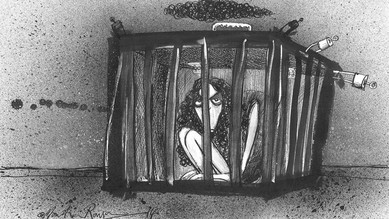
"I know that this place that I enter, the inner-space surrounding me – in which I can’t be, can’t breathe, can’t exist, but can’t not exist – also itself can’t be. A room for which there is no room. A place that makes no sense, that no sense can be made of, but which is all there is when I am in it. It is negative upon negative. Blackness ever blackening. Obscurity and obstacle always increasing, arriving at a point where nothing can be retrieved, mended – and then more and further, beyond my capacity to imagine more. A struggle that only and always resolves itself into a further impossibility, to infinity, eternity; a terrifying forever, in the most inexplicably inhuman sense of the word. And this place, this condition that has me in it, while the world mouths at me on the outside, is where I am, is what has happened, is why; and makes everything, inside and out, life itself, simply, really simply, impossible. I am islanded in the impossible, and unreachable. Yet, always the impossibility gets worse. There is no end to the worseness, the tumbling of can’tness down and down, in and in, to can’tnesses that I have never before imagined, or at any rate have forgotten, that imply further depths or intensities of can’tness that I haven’t dared to fear, but I can see coming, or me moving towards. That, roughly, is what it is like being at the blackest end of the continuum. It is like living inside this paragraph, which in its speed and insistence, melodrama and bumbling words fails to convey how awful and how physical it is, and how much I don’t want to be in it..."
 RSS Feed
RSS Feed
